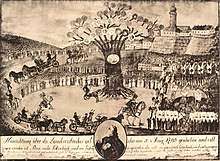Ignác Martinovics
Ignác Martinovics (Serbo-Croatian: Ignjat Martinović, Игњат Мартиновић; 20 July 1755 – 20 May 1795) was a Hungarian scholar, philosopher, writer, secret agent, Freemason and a leader of the Hungarian Jacobin movement. He was condemned to death for high treason and beheaded on 20 May 1795, along with count Jakab Sigray, Ferenc Szentmarjay, József Hajnóczy and others.

Biography
Early life and education
His father, Mátyás Martinovics was one of the nobles of Albanian descent who as a result of the Great Turkish War left Ottoman Serbia in 1690 under the leadership of Arsenije III Čarnojević during the Great Migrations of the Serbs and resettled in Délvidék, Hungary.[1][2][3][4][5][6] During his lifetime, Ignác Martinovics stated that his father was either a Serb tavern keeper or an Albanian noble in military service.[1] Mátyás Martinovics served in the Austrian army[2], he converted from Eastern Orthodoxy to Carholicism and his family moved to Pest in the second half of the 17th century.[2] There he married Mária Poppini,[4] a German[1] commoner from Buda, they had five sons and two daughters. Ignác Martinovics was born in Pest and educated by Franciscans[2] He finished his first classes in a Piarist school and chose to enter the Franciscan order. Martinovics took theological studies in the university of Buda from 1775-1779.
Political activity and execution


From 1783 he was a teacher in natural sciences at the University of Lemberg. During his academic career in Lemberg he joined to the Austrian secret agency, where his talents were recognized. During that time, he had to travel a lot, he accomplished many missions at home and abroad.
After the death of the Holy Roman Emperor, Joseph II, in February 1790, enlightened reforms in Hungary ceased, which outraged many reform-oriented francophone intellectuals who were followers of new radical ideas based on French philosophy and enlightenment.
Martinovics career in the secret agency became successful, he was applied as a personal secret agent by Holy Roman Emperor Leopold II until 1792. In his Oratio pro Leopoldo II Martinovics is explicit that only the authority that follows from a social contract should be recognized; he saw the aristocracy as the enemy of mankind, because they prevented people from becoming educated. In another of his works, Catechism of People and Citizens, he argued that citizens tend to oppose any repression and that sovereignty resides with the people. As the founder of the Hungarian Jacobin Clubs, he was considered an idealistic forerunner of great thought by some, and an unscrupulous adventurer by others. He became a Freemason. He was in favour of a federal republic for Hungary, thus he established two republican secret clubs: one for aristocratic members, and one for members with bourgeois background. He was in charge of stirring up a revolt against the nobility among the Hungarian serfs. He established four territorial directorates for the secret societies, their directors were János Laczkovics, József Hajnóczy, Ferenc Szentmarjay and Jakab Sigray. The new monarch, Emperor Francis II dismissed Martinovics and his boss, Ferenc Gotthardi, the former chief of the secret police, for these subversive acts. He was executed, together with six other prominent Jacobins, on 20 May 1795. More than 42 members of the republican secret society were arrested, including the poet János Batsányi and linguist Ferenc Kazinczy.[7][8][9][10][11]
Honors
The most important masonic lodge of Budapest belonging to the Hungarian Grand Orient is named after him.[12] Two postage stamp were issued in his honour by Hungary; on 12 June 1919[13] and on 15 March 1947[14].
References
- Lendvai, Paul (2004). The Hungarians: A thousand years of victory in defeat. Princeton University Press. p. 184. ISBN 9780691119694.CS1 maint: ref=harv (link)
- Fine, John VA (2006). When Ethnicity Did Not Matter in the Balkans: A Study of Identity in Pre-Nationalist Croatia, Dalmatia, and Slavonia in the Medieval and Early-Modern Periods. University of Michigan Press. p. 539. ISBN 9780472025602.CS1 maint: ref=harv (link)
- "Koncepcije o Srpskoj Vojvodini, Iliriku, Dunavskoj konfederaciji, Istočnoj Švajcarskoj..." Kulturni centar Novog Sada (in Serbian). 2018-09-07. Retrieved 2019-01-23.
- Vilmos Fraknói, Martinovics élete, p. 11, Budapest, 1921, Az Athenaeum Irodalmi És Nyomdai R.-T. Kiadása,
- Dr. Zsigmond Várady, Martinovics Ignác, p. 19, 1909 Deutsch Zsigmond és társa könyvkereskedése,
- "Концепције о Српској Војводини, Илирику, Дунавској конфедерацији, Источној Швајцарској..." Културни центар Новог Сада (in Serbian). 2018-09-07. Retrieved 2020-02-21.
- Charles W. Ingrao : The Habsburg Monarchy, 1618–1815, Volume 21 of New Approaches to European History, Publisher: Cambridge University Press, 2000 ISBN 9781107268692
- Jean Berenger, C.A. Simpson: The Habsburg Empire 1700-1918 , Publisher: Routledge, 2014, ISBN 9781317895725
- Tomasz Kamusella: The Politics of Language and Nationalism in Modern Central Europe, Publisher: Palgrave Macmillan, 2009, ISBN 9780230550704
- Paschalis M. Kitromilides: Enlightenment and Revolution, Publisher: Harvard University Press, 2013, ISBN 9780674726413
- Peter McPhee: A Companion to the French Revolution -PAGE: 391 , Publisher: John Wiley & Sons, 2014, ISBN 9781118977521
- http://szabadkomuvesseg.hu/
- https://colnect.com/en/stamps/stamp/190131-Ignác_Martinovics-Social_Revolutionists-Hungary
- https://colnect.com/en/stamps/stamp/179863-Ign%C3%A1c_Martinovics_1755-1795_philosopher-Hungarian_Freedom_Fighters-Hungary
Sources : 'Paul Lendvai Die Ungarn. Ein Jahrtausend Sieger in Niederlagen. C. Bertelsmann Verlag, München 1999.